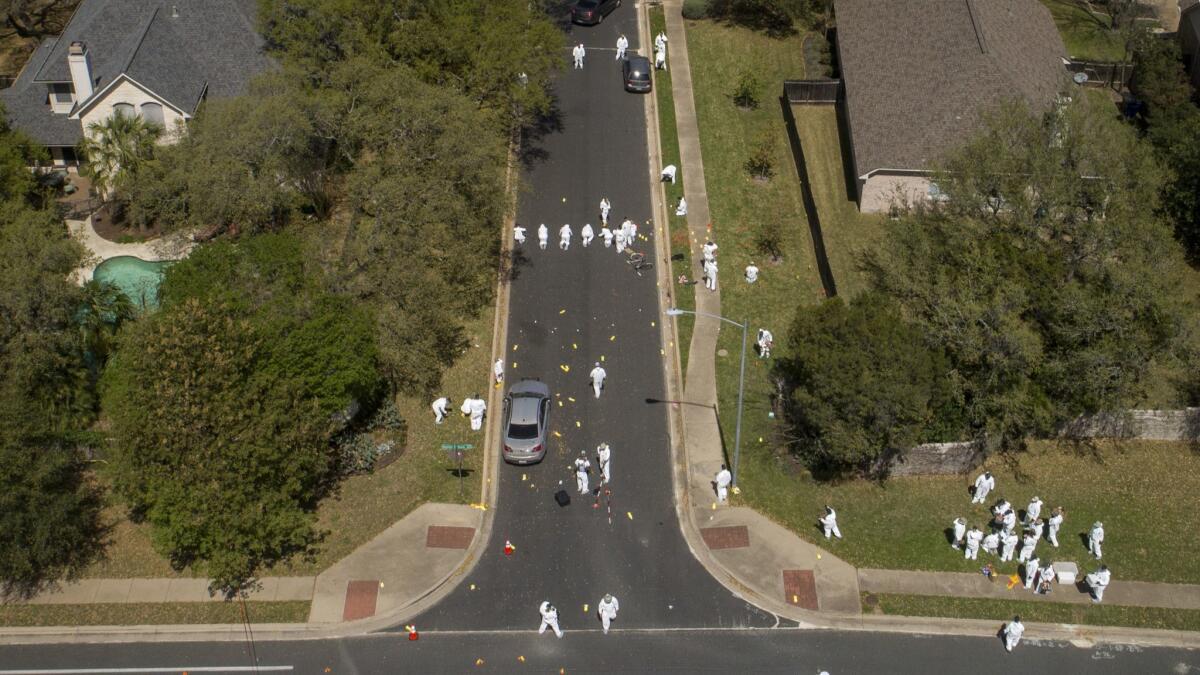Op-Ed: An Austin family recounts the horrors of repeated bombings — in Syria

- Share via
The Austin bomber, Mark Conditt, killed himself Wednesday morning less than two miles from my home. Fear had mounted with each explosion in our city over the last month. Over that same period of time, I was interviewing Syrian refugees who had resettled in Austin, Texas, people for whom life under the threat of bombs is horribly familiar.
I can never understand what they endured, but the threat in Austin, a city that has always felt so safe for my family and my children, makes me understand their stories in a new way.
Almost every interview begins with a story. Every refugee I meet is on the search for one that is so compelling that the world will sit up and pay attention. Usually that story happened to someone else. Often there are pictures and videos. Look at this boy, they tell me; he was pinned to the wall of an office building by a missile that never exploded. Look at this little girl, who died in eastern Ghouta while putting the gas mask on her sister. Look at this man, clutching his curly-haired 3-year-old twin sons; see how much he loved them before they were gassed by their own government?
It’s the retelling of mundane moments, however, that affect me the most. It becomes gut-wrenching when it’s personal, when it’s small, when it could have happened to anyone.
On Tuesday, I interviewed a woman I’ll call Duaa, and her husband, Jebreel, whose family I have become close to over the last few months. They and their five children witnessed the beginning of the revolution in Daraa, Syria. After lunch, we drank black tea from the white-and-gold teacups she brought to the U.S. all the way from Daraa. I wondered as I sipped whether the chip in my teacup was from one of her children, or if it happened somewhere along the way to this housing-authority apartment in east Austin.
Here you have had five drops of water. In Syria, it rained.
Duaa uses personal landmarks when talking about the start of the war in Syria. The first shots in Daraa were fired in 2011 at the Omari Mosque, where her husband and sons prayed every Friday. Days later, government tanks barreled into town; one tank rolled through their oldest daughter’s garden wall. The government’s missiles were staioned at a soccer field near a relative’s house.
On Tuesday, while I sat at Duaa’s table, my phone buzzed with a news notification. Another package — mercifully still intact this time — had been discovered at a FedEx facility near the Austin airport. I asked Duaa and Jebreel whether they had heard about the Austin bombings; they had not.
As I began explaining the news through our translator, I relied on the same type of personal landmarks they did: The first bomb went off just blocks from my children’s school. The second killed a young man who’d been accepted at the University of Texas, where I got my graduate degree. The third bomb was in the neighborhood of a close friend. My family hikes behind the road where the tripwire bomb injured two young men.
I was quick to acknowledge that there is no comparison to what their family endured over years. Jebreel used the metaphor of water: “Here you have had five drops of water. In Syria, it rained.”
That echoed in my head as I picked up my elementary school-aged children and answered their questions about why someone would send bombs in the mail.
Duaa and Jebreel’s youngest daughter was still in elementary school when the war in Syria began. A suicide bombing outside her classroom sent shrapnel through the window, missing her by inches. When Duaa finally found her in the chaos, they had to step over blown-up body parts to make their way home.
Her daughter still remembers picking her way over other people’s fingers and feet.
I could not get that out of my head either as I tucked my little girls into bed. I do not want my own daughters to live in a city where 23-year-old men send random bombs to people. Duaa did not want her children to be in a city getting bombed by its own government.
They fled to Jordan and eventually the United States.
I can’t help but wonder what I would do if Austin’s bombing weren’t a few frightening incidents, but an ongoing war. What would I say to my kids? How would we escape? What would we save? What would be lost?
I picture myself in some bewildering new country with nothing but my favorite coffee mug. Then I stop. I know I cannot comprehend how refugees made it through all that they endured. It frustrated me that there was not more news coverage of what we were going through in Austin; I cannot comprehend the grief of knowing that the world is ignoring your nation’s disintegration.
“Being safe in your home is the ultimate gift for any human being,” Duaa told me. “We don’t know how important that is until we lose it.”
She will be glad when I tell her the bombings are over in Austin. But it also will be a bittersweet moment. Safety in her home country is something she and other Syrians may never find again.
Jessica Goudeau, a writer and content strategist in Austin, is writing a book about resettled refugees. @jessica_goudeau
Follow the Opinion section on Twitter @latimesopinion and Facebook
More to Read
A cure for the common opinion
Get thought-provoking perspectives with our weekly newsletter.
You may occasionally receive promotional content from the Los Angeles Times.









